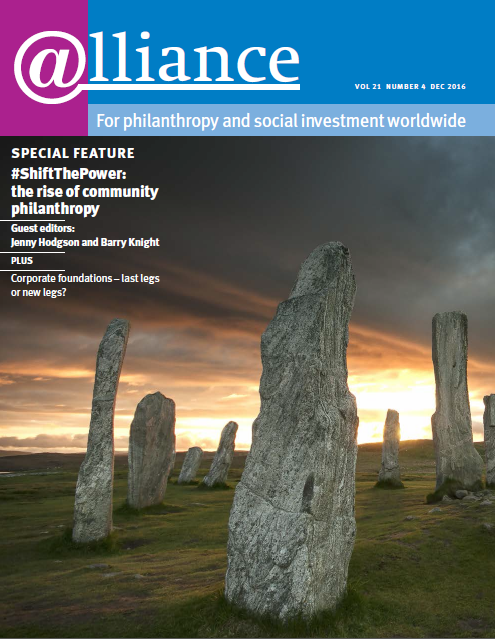The September 2016 Alliance breakfast club, kindly hosted by Charities Aid Foundation, focused on the influence of philanthropy, and what limits, if any, should be imposed. The discussion was rooted in Alliance magazine’s September 2016 special feature: ‘Does philanthropy have too much influence?’ Here, a participant in that discussion, Eugenie Harvey, offers her thoughts.
Alliance’s September issue made thought-provoking reading, as did the Alliance breakfast club meeting hosted by CAF. Of the many and varied contributions to the subject, most if not all made the point that philanthropy’s influence is most effectively and transparently exerted through support for civil society rather than seeking to shape public policy directly. As Joanne Florino puts it, civil society’s essence as a ‘polyarchy’ – a society in which there are many independent sources of power – tempers philanthropy’s influence through the diverse and dynamic ecosystem in which it operates.
Often the issue is ‘locally unpopular’ – for example, support for the Bulgarian LGBTI community, improved access to education for Roma children, and increasingly, the treatment of refugees – but so much the better for a group of philanthropists seeking long-term systemic social change.
This view is almost certainly shared by our 200-plus members and 5,000-plus donors whose philanthropic giving is facilitated through our live crowdfunding events in cities in the UK and Ireland, across Central and Eastern Europe (Bulgaria, Romania, Serbia, Turkey, Hungary, Slovakia and Poland) as well as in Australia, New Zealand, South Africa, Canada and the US.
At every event, donors and would-be donors hear from as many as four CSOs working across the full spectrum of need – human rights, social inclusion, health and education – both to address the need and to advocate for policy change. Often the issue is ‘locally unpopular’ – for example, support for the Bulgarian LGBTI community, improved access to education for Roma children, and increasingly, the treatment of refugees – but so much the better for a group of philanthropists seeking long-term systemic social change.
While the value of philanthropic contributions facilitated are relatively small compared to those made by major institutions, it’s our belief that in ‘democratizing philanthropy’ in this way, the powerful combination of grassroots CSOs working hand-in-glove with groups of committed, influential local donors will strengthen the ties that bind civil society.
Eugenie Harvey, International director, The Funding Network
On the same topic: ‘Funders need to use knowledge and exert influence‘ by Lena Baumgartner, ‘Give power to grantees‘ by Angela Seay, and ‘Choose carefully: thoughts on philanthropy’s bankers‘ by Karin Jestin.






Comments (0)